National historic events
National historic events
Profiled below are some of the national historic events that have been designated through the recommendations of the Historic Sites and Monuments Board of Canada (HSMBC). Note that additional national historic designations will continue to be added to this page.
A full list of national historic persons, places and events can be found on the Directory of Federal Heritage Designations.
Search national historic events
| Image | National Historic Event |
|---|---|
Creation of the Northwest Mounted Police
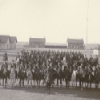 |
Creation of the Northwest Mounted PoliceThis designation was reviewed by the Historic Sites and Monuments Board of Canada in 2023. Image copyright : © Library and Archives Canada |
Congregation de Notre Dame
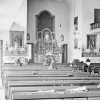 |
Congrégation de Notre-DameThis designation was reviewed by the Historic Sites and Monuments Board of Canada in 2023. Image copyright : © Library and Archives Canada |
Prairie Farm Rehabilitation Administration
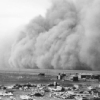 |
Prairie Farm Rehabilitation AdministrationFederal government program aimed at improving the severe drought and soil erosion conditions faced by many farming and ranching families living in the prairies provinces during the Great Depression of the 1930s. Image copyright : © Glenbow Library and Archives Collection |
The Caraquet Riot of 1875
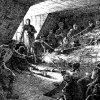 |
The Caraquet Riot of 1875Milestone event in Acadian history and within Canadian society in the 19th and 20th centuries regarding denominational schools, the riot is an early example of the efforts of the country’s religious and linguistic minorities to resist discrimination. Image copyright : © Canadian Illustrated News / Canadian Research Knowledge Network |
Canadarm Deployment in Space 1981
 |
Canadarm Deployment in Space, 1981The development and construction of a highly sophisticated and manoeuvrable robotic arm in the 1970s, and its first voyage into space in 1981 launched the beginning of a new era in Canadian space exploration. Image copyright : © Canadian Space Agency |
The Quong Wing Legal Challenge 1912 1914
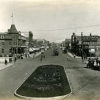 |
The Quong Wing Legal Challenge (1912–1914)Exemplified the tireless efforts of Chinese Canadians to fight racial discrimination in the courts during the early 20th century. Image copyright : © Moose Jaw Public Library Archives Department |
The Saskatchewan Doctors Strike of 1962
 |
The Saskatchewan Doctors’ Strike of 1962Perhaps the best-known and most significant doctors’ strike of the 20th century, important impact on the development of publicly funded health care in Canada. Image copyright : © Bettmann / Getty Images |
Black Railway Porters and their Union Activity
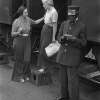 |
Black Railway Porters and their Union ActivityBlack railway porters broke new ground by gaining recognition for Blacks in labour relations and by making important contributions to the human rights movement in Canada. Image copyright : © Library and Archives Canada |
The Canadian Corps of Commissionaires
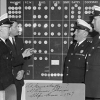 |
The Canadian Corps of CommissionairesNationwide private and non-profit organization of longstanding service to reintegrate Canada’s veterans and their families into Canadian society. Image copyright : © Commissionaires National Archive |
Colored Hockey League of the Maritimes
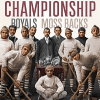 |
Colored Hockey League of the MaritimesMaritime segregated competitive hockey league, only league of its kind in Canada and in the world in the early 1900s. It illustrates how African Canadian communities fought for equality in sports and social change in Canada. Image copyright : © Canada Post Corporation / Library and Archives Canada |
Amos Indian Residential School
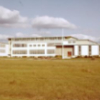 |
Amos Indian Residential School (1955–1973)Between 1955 and 1973, Anicinapek children from southwest Quebec and Atikamekw Nehirowisiw children from the Mauricie region were uprooted from their families and placed in the Amos Indian Residential School. Image copyright : © Deschatelets-NDC Archives in Richelieu, Quebec |
Shiibaashka’igan – The Jingle Dress
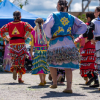 |
Shiibaashka’igan – The Jingle DressThe shiibaashka’igan – jingle dress is a sacred Anishinaabe women’s dress and dance tradition. Image copyright : © Parks Canada |
The Creation of Canada’s Permanent Military Force (1871–1883)
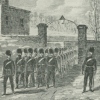 |
The Creation of Canada’s Permanent Military Force (1871–1883)The creation of a small permanent force marked the beginnings of military professionalization in Canada. Image copyright : © Courtesy of the Department of National Defence |
Arrival of Vietnamese refugees in Canada
 |
Arrival of Vietnamese refugees in CanadaAfter the end of the Vietnam War in 1975, Canada accepted nearly 200,000 Vietnamese refugees who fled persecution and difficult living conditions, and braved significant dangers. Image copyright : © Library and Archives Canada |
Japanese Canadian Soldiers of the First World War and the Fight to Win the Vote
 |
Japanese Canadian Soldiers of the First World War and the Fight to Win the Vote222 Japanese Canadian soldiers overcame barriers to enlistment and prejudice and fought for Canada on the Western Front between 1916 and 1918. Image copyright : © Nikkei National Museum & Cultural Centre |
1972 Summit Series
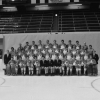 |
1972 Summit SeriesA hockey series of eight games between Canada and the Union of Soviet Socialist Republics (USSR) held in September 1972. Image copyright : © Library and Archives Canada |
The Creation of the National Flag
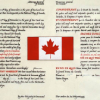 |
The Creation of the National FlagAn all-party parliamentary committee reviewed thousands of options in choosing the simple and modern design that became our national flag. Image copyright : © Library and Archives Canada |
Upper Canadian Act of 1793 Against Slavery
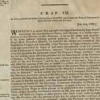 |
Upper Canadian Act of 1793 Against SlaveryFirst legislation in the British Empire against enslavement Image copyright : © Public domain |
Abolition Movement in British North America
 |
Abolition Movement in British North AmericaThe Movement represents the struggle to abolish slavery in British North America between 1783 and 1860. Image copyright : © Parks Canada |
Victorian Order of Nurses VON
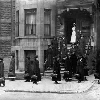 |
Victorian Order of Nurses (VON)VON was a major national organization which provides health services to poor and isolated Canadians. Image copyright : © Library and Archives Canada |
Canada Capital
 |
Canada's CapitalAfter the union of Upper and Lower Canada in 1841, Kingston, Montréal, Toronto, and Québec were in succession the seat of government. Image copyright : © Parks Canada |
Preston Rivulettes Women Hockey Team
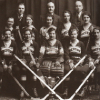 |
Preston Rivulettes Women’s Hockey TeamConsidered the most successful women’s hockey team in Canada Image copyright : © Courtesy of the City of Cambridge Archives |
Charlottetown and Quebec Conferences of 1864
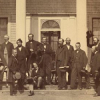 |
Charlottetown and Québec Conferences of 1864Two conferences held during the fall of 1864 were fundamental to the creation of the Dominion of Canada Image copyright: © Library and Archives Canada |
Edmonton Grads
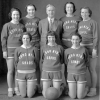 |
Edmonton GradsIn a twenty-five year history, beginning in 1915, the women of the Commercial Graduates Basketball Club, coached by J. Percy Page, achieved world recognition. Image copyright: © Government of Alberta |
Canadian War Memorials Fund
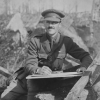 |
Canadian War Memorials FundCreated in 1916 by Max Aitken (Lord Beaverbrook), the Fund was Canada’s first war art program, establishing a tradition of commissioning artists to depict Canada at war. Image copyright: © Library and Archives Canada |
Celebrations of Emancipation Day
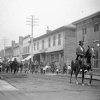 |
Celebrations of Emancipation DayPeople of African descent in Upper and Lower Canada marked the abolition of enslavement in 1834 with organized celebrations that gave rise to annual events. Image copyright: © Library and Archives Canada |
Experience of Italian Sojourners
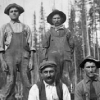 |
Experience of Italian SojournersFrom the turn of the 20th century to the First World War, Italian sojourners played a pivotal role in the development Canada’s infrastructure as prolific builders, miners and manufacturers Image copyright: © Library and Archives Canada |
Black Migrations to Sierra Leone (1792 and 1800)
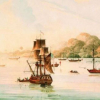 |
Black Migrations to Sierra Leone (1792 and 1800)Exemplifies the frustrations and disillusionment of self-emancipated and free people of African descent in Nova Scotia and New Brunswick. Image copyright: © Maritime Museum of the Atlantic / Nova Scotia Museum |
Exclusion of Chinese Immigrants (1923–1947)
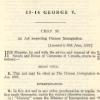 |
Exclusion of Chinese Immigrants (1923–1947)Period of time when the Chinese Exclusion Act was in effect, efforts of Chinese Canadians to prevent its passage and lobby for less restrictive immigration policies. Image copyright: © Public domain / Canadian Museum of Immigration at Pier 21 |
Aboriginal Military Service in the First World War
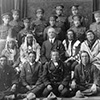 |
Aboriginal Military Service in the First World WarFirst time the Canadian forces integrated a substantial number of Aboriginal men into their ranks as individual soldiers. Image copyright: © Library and Archives Canada |
Chinese Construction Workers on the Canadian Pacific Railway
.jpg) |
Chinese Construction Workers on the Canadian Pacific RailwayRole of the Chinese workers in building the Canadian Pacific Railway Image copyright: © Library and Archives Canada |
Komagata Maru Incident of 1914
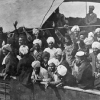 |
The Komagata Maru Incident of 1914The passengers on board the S.S. Komagata Maru and their supporters in the local South Asian community challenged Canada’s racist and exclusionary immigration policies. Image copyright: © Library and Archives Canada |
Jamaican Maroons in Nova Scotia
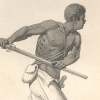 |
Jamaican Maroons in Nova ScotiaCommunity in exile in Nova Scotia from 1796 until 1800, influence still felt by African Nova Scotians. Image copyright: © Nova Scotia Archives B. Edwards |
Group of Seven
 |
Group of SevenCanadian landscape painters who first exhibited their work in 1920. Image copyright: © Library and Archives Canada |
Role of the Canadian Merchant Navy during the Second World War
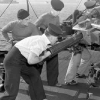 |
Role of the Canadian Merchant Navy during the Second World WarContributed to the final outcome of World War II by transporting materiel and military personnel throughout the world. Image copyright: © Library and Archives Canada |
Stanley Cup
 |
The Stanley CupOne of the oldest and most prestigious trophies to be won by Professional athletes in North America. Image copyright: © Parks Canada / Angela Voortman |
Winning of the Vote by Women
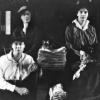 |
Winning of the Vote by WomenDemocracy, political equality and full citizenship were all advanced when Canadian women won the right to vote in the early 20th century. Image copyright: © Archives of Manitoba |
Breaking Racial Barriers in the National hockey league
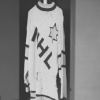 |
Breaking Racial Barriers in the National Hockey LeagueHockey players overcoming racial barriers in professional hockey. Image copyright: © Library and Archives Canada |
Nº number 2 Construction Battalion, CEF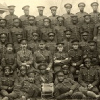 |
Nº 2 Construction Battalion, C. E. F.Reflects the strong determination of Black men to overcome racism and contribute to Canada’s First World War effort. Image copyright: © Museum Windsor |
Underground railroad
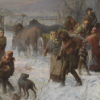 |
The Underground RailroadFrom the early 19th century until the American Civil War, settlements along the Detroit and Niagara rivers were important terminals of the Underground Railroad. Image copyright: © Subscription Fund Purchase / Bridgeman Images |
Tackaberry Skates
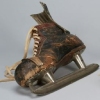 |
Tackaberry SkatesIn 1905, expert shoemaker George E. Tackaberry crafted a durable hockey boot with innovations such as a snug fit to prevent chafing, a reinforced toe and heel, improved arch support, and a thicker tongue. Image copyright: © Canadian Museum of History |
Asahi Baseball Team
 |
Asahi Baseball TeamBetween 1914 and 1941, at a time when Japanese Canadians faced racism, Vancouver's Asahi Baseball Team thrilled fans by winning championships in senior amateur leagues. Image copyright: © Japanese Canadian National Museum |
Service of the Royal Canadian Air Force
 |
Service of the Royal Canadian Air Force (RCAF) during the Second World WarThe Service of the Royal Canadian Air Force (RCAF) served in European campaign and all other theatres during the Second World War. Image copyright: © Library and Archives Canada |
Ducks Unlimited
 |
Ducks Unlimited CanadaDucks Unlimited Canada (DUC) was founded in Winnipeg in 1938 by private Canadian hunter-conservationists, in collaboration with the More Game Birds in America Foundation. Image copyright: © Parks Canada |
Construction of the Prince Edward Island Railway
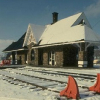 |
Construction of the Prince Edward Island RailwayThe construction of the Prince Edward Island Railway in 1871 created a transportation link across the island that stimulated employment, contributed to the social and cultural life of Islanders, and generated economic and commercial opportunities. Image copyright: © Parks Canada |
Vice Admiralty Court of Halifax
 |
Vice Admiralty Court of HalifaxThe Vice Admiralty Court of Halifax was one of the earliest courts in Nova Scotia to adjudicate maritime civil law and administer imperial trade and revenue regulations. Image copyright: © Library and Archives Canada |
Cunningham v. vs Tomey Homma
 |
Cunningham v. Tomey HommaProminent Japanese Canadian Tomekichi “Tomey” Homma fought a landmark legal battle in 1900–1903 against a provision of the British Columbia Provincial Elections Act, which barred Asian Canadians and First Nations from voting. Image copyright: © Courtesy of Keiko Tenney-Sean Homma |
Discovery of Insulin
 |
Discovery of InsulinDiabetes in its severe form used to be a death sentence as patients either starved from the prescribed low-calorie glucose-free diet, or died of the disease’s complications. Image copyright: © Library and Archives Canada |
Early Commercial Radio Broadcasting in Canada 1918-1932
 |
Early Commercial Radio Broadcasting in Canada, 1918-1932Commercial radio in Canada began with Montréal station XWA. Image copyright: © Library and Archives Canada |
Dionne Quintuplets
 |
The Dionne QuintupletsBorn to Elzire and Oliva Dionne, on 28 May 1934, the birth and survival of five identical, premature and undersized infants – Yvonne, Annette, Cécile, Émilie, and Marie – was an unprecedented event that captivated the world and brought attention to a small Ontario town. Image copyright: © Library and Archives Canada |
West Indian Domestic Scheme (1955–1967)
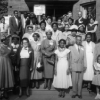 |
West Indian Domestic Scheme (1955–1967)The West Indian Domestic Scheme was a targeted immigration program through which approximately 3,000 women from the Caribbean came to Canada to work as domestic servants. Image copyright: © The City of Toronto Archives |
Canada First Industrial Dairy School
 |
Canada’s First Industrial Dairy SchoolÉdouard-André Barnard (1835–1898), Jean-Charles Chapais Jr. (1850–1926), and Damase Rossignol (1848–1901) established Canada’s first industrial dairy school in 1881, in Saint-Denis de Kamouraska, Quebec. |
War Brides
 |
War BridesBetween 1942 and 1948 some 48,000 women, accompanied by 22,000 children, mostly from Great Britain, landed here at Pier 21 as wives of Canadian servicemen stationed abroad during the Second World War. Image copyright: © Library and Archives Canada |
Enslavement of African People in Canada (circa 1629–1834)
 |
The Enslavement of African People in Canada (c. 1629–1834)Between c. 1629 and 1834, there were more than 4,000 enslaved people of African descent in the British and French colonies that became Quebec, Ontario, Nova Scotia, Prince Edward Island, and New Brunswick. |
Examination Unit (1941–1945)
 |
The Examination Unit (1941–1945)The Examination Unit (1941–1945) was the first in Canada and the only civilian cryptographic bureau active during the Second World War. Image copyright: © Library and Archives Canada |
Red River Expedition of 1870
 |
The Red River Expedition of 1870In May 1870, Col. Garnet J. Wolseley led an expedition from Toronto, Ontario, to the Red River Settlement in what is now Manitoba. Image copyright: © Library and Archives Canada |
Expo 67
 |
Expo 67Expo 67, held in Montréal from April to October 1967, was a World’s Fair that formed the centrepiece of Canada’s celebrations for the centennial of Confederation. |
Establishment of Ice Roads in the Northwest Territories
 |
Establishment of Ice Roads in the Northwest TerritoriesAn integral part of transportation systems in the North, engineered ice roads have strengthened regional economic development, especially in the Northwest Territories. Image copyright: © Ian Mackenzie / Wikipedia |
Spanish Flu in Canada (1918-1920)
 |
The Spanish Flu in Canada (1918-1920)The virulent Spanish flu, a devastating and previously unknown form of influenza, struck Canada hard between 1918 and 1920. This international pandemic killed approximately 55,000 people in Canada. Image copyright: © Library and Archives Canada |
Canadians in the Korean War
 |
Canadians in the Korean WarBetween 1950 and 1953, Canada participated in the Korean War as part of a United Nations multinational force to protect South Korea from invasion by North Korea. Image copyright: © The Canadian Encyclopedia |
Halifax Explosion
 |
Halifax ExplosionOn December 6, 1917, the explosives-laden SS Mont-Blanc and SS Imo collided in Halifax Harbour, causing a massive explosion, a tidal wave, and fires. Image copyright: © Library and Archives Canada |
Military Nurses
 |
Military NursesSince 1885, thousands of Canadian nurses have provided skilled and compassionate care to the sick and wounded in battle. Image copyright: © National Archives of Canada |
First Women's Institute
 |
First Women's InstituteThis 19th-century farmhouse is the birthplace of the Women's Institutes (WI), an organization that played a vital role in thousands of small communities. Image copyright: © Parks Canada / Dianne Dodd |
Toronto Maple Leafs
 |
Toronto Maple LeafsSupported by an extremely loyal fan base, the Toronto Maple Leafs Hockey Club is one of the most successful sport franchises in North America. Image copyright: © Library and Archives Canada |
Meshikamau-shipu Travel Route
 |
Meshikamau-shipu Travel RouteThe Meshikamau-shipu Travel Route in Labrador is approximately 330 kilometres and follows a series of rivers and lakes between Sheshatshiu on Lake Melville/Atatshi-uinipeku and the Meshikamau area, which is the location of the former Lake Michikamau and today is part of the Smallwood Reservoir. Image copyright: © Petshishkapushkau. Michael Weiler |
First Aeroplane Flying in Canada
 |
First Aeroplane Flying in CanadaOn February 23, 1909, more than 100 people witnessed the first successful powered flight in Canada, as the Silver Dart lifted off the ice of Baddeck Bay and flew 800 metres. Image copyright: © Library and Archives Canada |
Sable Island Humane Establishment
 |
Sable Island Humane Establishment (1801–1958)Between 1801 and 1958, this shore-based rescue organization rescued the crews and passengers, and recovered the cargoes from the international vessels that wrecked on Sable Island, a 31-km2 stretch of crescent-shaped land approximately 290 kilometres southeast of Halifax. Image copyright: © Library and Archives Canada |
Early Science in Canada’s North and the Hudson Bay Company
 |
Early Science in Canada’s North and the Hudson’s Bay Company (1768-ca. 1810)In 1768, the Hudson’s Bay Company (HBC) began its collaboration with the Royal Society, a British learned society for science, to facilitate the observation of the Transit of Venus at Prince of Wales Fort in 1769. |
German U-Boat Attacks at Bell Island
 |
German U-Boat Attacks at Bell Island (1942)During the Second World War, Newfoundland’s Bell Island, a strategically vital iron-ore processing and shipping centre in Conception Bay, was targeted by German U-boats seeking to disrupt the supply of iron ore to Canada’s steel mills. Image copyright: © Library and Archives Canada |
Stratford Festival
 |
Stratford FestivalFounded in 1953, the Stratford Festival built its initial success on the annual production of the plays of William Shakespeare, but quickly grew into a major theatre with an international reputation for excellence in the classics. Image copyright: © Parks Canada / L. Lockwood |
Residential School System
 |
The Residential School SystemResidential schools for Indigenous children existed in Canada from the 17th century until the late 1990s. During the 19th and 20th centuries, a formal system for the residential schooling of Indigenous children was established and expanded throughout Canada. |
First Electric Telegraph
 |
First Electric TelegraphDecember 19, 1846 marked the inauguration of the telegraph in Canada. Image copyright: © Library and Archives Canada |
Newfoundland Entry into Confederation
 |
Newfoundland's Entry into ConfederationNewfoundland entered Confederation on 31 March 1949. In 1948 a national convention proposed a return to Responsible Government but a spirited campaign led by J.R. Smallwood convinced a small majority to accept union with Canada which 19th century voters had decisively rejected. Image copyright: © Library and Archives Canada |
Universal Negro Improvement Association of Canada
 |
The Universal Negro Improvement Association of Canada (UNIA)The Universal Negro Improvement Association (UNIA) was the first global Black nationalist organization with a chapter in Canada. |
Abenaki Basket Making Industry
 |
Abenaki Basket-Making Industry (1870-1920)Between 1870 and 1920, the Abenaki basket-making industry flourished in Odanak and Wôlinak, two communities located on the south shore of the St. Lawrence River. Image copyright: © McCord Museum |
Winnipeg Falcons Hockey Club
 |
Winnipeg Falcons Hockey ClubThe Falcons hockey club was formed in 1909 from a merger of the Icelandic Athletic Club and the Vikings, adopting the name of Iceland’s national bird. The team represented Canada at the 1920 Olympics in Antwerp, Belgium, winning the first Olympic gold medal in hockey. Image copyright: © Library and Archives Canada |
Japanese Experience in Alberta
|
Japanese Experience in AlbertaAt the turn of the 20th century, Japanese immigrants laid the foundations of a community that would be strengthened by the arrival of Japanese Canadians forcibly removed from the West Coast by the federal government during the Second World War. Image copyright: © Library and Archives Canada |
Liberation of the Netherlands
|
Liberation of the NetherlandsCanada brought liberty and life to the Netherlands at the end of the Second World War. The bonds of friendship forged between Canada and the Netherlands stand strong to this day. Image copyright: © Library and Archives Canada |
Assiniboine Park and Zoo
|
Assiniboine Park and ZooEstablished in 1904, the combined Assiniboine Park and Zoo formed the centrepiece of Winnipeg’s innovative and forward-looking urban park system. Image copyright: © Library and Archives of Canada |
Arrival of displaced persons in Canada 1945-1951
|
The arrival of displaced persons in Canada, 1945-1951After the Second World War, nearly 187,000 people fled from devastated Europe to Canada, including Holocaust survivors, former prisoners of war, and thousands who were unable or unwilling to return to their pre-war homes. Image copyright: © Canada Science and Technology Museum Archives |
Want to see more heritage designations?
Search through over 3,600 designations listed in the Directory of Federal Heritage Designations (DFHD)
The Directory of Federal Heritage Designations offers a complete list of federal designations stemming from various programs managed by Parks Canada. It includes information on designated persons, places, and events of national historic significance under the National Program of Historical Commemoration, as well as railway stations, lighthouses, and federal buildings that are of national historic value or interest.
- Date modified :